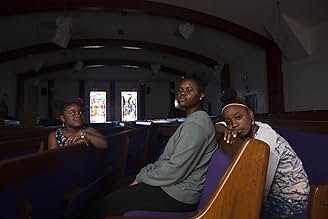"A Love Song for Latasha" isn't only a sentimental recollection--although it's that, too--of the life of Latasha Harlins, who was shot to death in the back of the head by a convenience store owner over, as the documentary short says, a dispute regarding a container of orange juice. While the 1992 Los Angels riots, or uprising, are usually described as a consequence of the acquittal of the officers who were videotaped beating Rodney King, this picture also considers the killing of Latasha, whose killer was convicted for manslaughter and never sentenced to prison, as a contributing factor. Much of this is told in the over-used style of text at the end of the movie before the credits. Before that, however, we get a uniquely constructed piece of documentary filmmaking.
Although only 19 minutes long, it took a while for me to warm up to the style of the picture--initially finding it distracting from the interviewees' recollections of Latasha's friend and cousin, including about her dream of becoming an attorney. Regardless, it's an innovative approach of recreated or reimagined footage as if from old home videos, often played as if being rewound, reflexively displaying the marks of its making, such as the addition of seemingly VHS static, haunting and always poetic. The real videotape at the center of the news story of Latasha's death is never shown here, on the other hand. Ultimately, "A Love Song for Latasha" isn't about her death; it's about the character and aspirations of a 15-year-old girl whose life was tragically cut short.






















